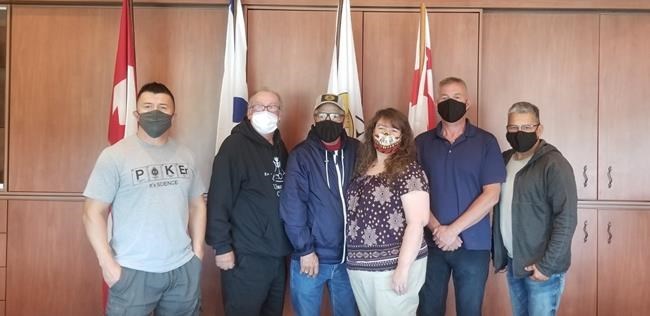CAPE BRETON, N.S. — A new alert system that will issue emergency messages to residents in five Nova Scotia Mi'kmaq communities is the first of its kind among Indigenous peoples in Canada, according to developers.
Jennifer Jesty, with the Union of Nova Scotia Mi'kmaq, said chiefs will be able to send alerts in Mi'kmaq and in English to community members in Eskasoni, Membertou, Potlotek, Wagmatcook and We’koqma’q by text, phone and email.
The five chiefs were in Membertou Thursday for a training session on how to use the alert system, which is scheduled to go live Sept. 1.
"We get to be the first to release it, but I'm willing to bet that this is going to catch on and you're going to see it pop up, not just in First Nations communities," Jesty, emergency management co-ordinator with the Mi'kmaq union, said in an interview Thursday.
There is growing interest in the project that began as a community initiative and it comes at a time when the use of the province's official emergency alert system is being criticized.
Nova Scotia police did not issue an alert during a manhunt in April when a shooter killed 22 people over a two-day rampage. And earlier this month, the RCMP's use of the system drew criticism when an emergency alert about a missing 14-year-old girl from We’koqma’q was not issued until a week after her Aug. 13 disappearance.
The Mi'kmaq alert system was in the works before these events, but Jesty said the timing of the rollout coincided with broader discussions about how and when authorities should be issuing emergency messages.
She was recently invited by Indigenous Services Canada to present her work to her counterparts across the country.
Jesty, who brought her experience as a paramedic and firefighter to the project, said giving chiefs decision-making power about alerts will save time and potentially save lives during critical situations such as severe weather, wildfires and missing person searches.
"If something does happen at two o'clock in the morning, they're (the chief) likely going to be the one to get the phone call," she said. "Well, they can just immediately go on their phone and set up the alert right away."
Jesty, who is from Eskasoni, kept cultural appropriateness in mind during the development process.
Summer students went door-to-door presenting the system to elders before posters and social media spread the word to the wider community. People can sign up by downloading the app, scanning a QR code or filling out an old-fashioned paper form.
Jesty said the fact the messages will be available in the Mi'kmaq language will help ensure older community members understand the alerts.
Chiefs can dictate their messages in both languages and send them from a phone or computer. Jesty has prepared guidelines, sample messages and a pre-recorded notice that will let recipients on the phone know an emergency alert from their chief will follow.
The system was developed with Everbridge, a company that works with municipalities, hospital networks and other organizations around the world on mass-notification systems.
Jesty said she considered working with the province's alert system but concluded the process to issue messages was too bureaucratic.
The Mi'kmaq Nation's system, she said, will save time and remove the step of going through the RCMP when urgent information needs to get out to the community.
"This decision can be made amongst the community itself and community leaders," she said.
This report by The Canadian Press was first published Aug. 27, 2020.
— By Holly McKenzie-Sutter in St. John's, N.L.
The Canadian Press



